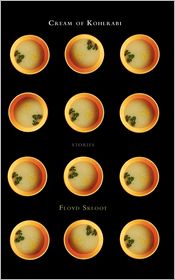In 2008, Floyd Skloot agreed to write a story for Portland Noir, a collection from Akashic Books that appeared the following year. His contribution, ”Alzheimer’s Noir,” was the first story he had written in six years. It is included in Cream of Kohlrabi, Skloot’s new selection of sixteen stories, the other fifteen of which were published in literary magazines between 1987 and 2002. Although his fourth novel, Patient 002, was published in 2007, it had been drafted and shelved a decade earlier. It seems that prose fiction has played a part in his creative psyche, but its role has hardly been clear or consistent.
 Skloot is best known as a poet and essayist who, since contracting a debilitating viral illness in 1988, has written superbly about the fragile persistence of mind and body. As the invalid reassembled his shattered memory while devising ways to handle life’s daily challenges, his work became a commentary on how meaning gets constructed in the first place. Admirably, Skloot as memoirist has rejected exceptionalism (the grab for 15-minutes-of-fame), preferring instead a discursive and topical approach in four books of essays that precisely and often humorously examine the facts of our vulnerable condition. (He has also written about his evolution as a writer in The Wink of the Zenith.) Where the essays conserve their energies in order to struggle toward comprehension, the poems often trace a narrative line from confusion, disordered perception, and fractured memory to a calm if tenuous stability. The essays help us understand how to regard the mind’s vulnerability; the poems form the strange shapes of recoveries. Form and control in Skloot’s work are tantamount to sanity.
Skloot is best known as a poet and essayist who, since contracting a debilitating viral illness in 1988, has written superbly about the fragile persistence of mind and body. As the invalid reassembled his shattered memory while devising ways to handle life’s daily challenges, his work became a commentary on how meaning gets constructed in the first place. Admirably, Skloot as memoirist has rejected exceptionalism (the grab for 15-minutes-of-fame), preferring instead a discursive and topical approach in four books of essays that precisely and often humorously examine the facts of our vulnerable condition. (He has also written about his evolution as a writer in The Wink of the Zenith.) Where the essays conserve their energies in order to struggle toward comprehension, the poems often trace a narrative line from confusion, disordered perception, and fractured memory to a calm if tenuous stability. The essays help us understand how to regard the mind’s vulnerability; the poems form the strange shapes of recoveries. Form and control in Skloot’s work are tantamount to sanity.
 Cream of Kohlrabi makes clear that Skloot has used prose fiction to produce a necessary and different vocal register while treating many of his typical subjects. If the essays and poems are spoken by an individual in exile from his former self and the demanding pace of modernity, the stories reinstate that same mentality among others going through a variety of similar trials. Skloot is our most accomplished chronicler of disorientation – and the first seven stories of Cream of Kohlrabi give us several characters struggling with dementia and dislocation.
Cream of Kohlrabi makes clear that Skloot has used prose fiction to produce a necessary and different vocal register while treating many of his typical subjects. If the essays and poems are spoken by an individual in exile from his former self and the demanding pace of modernity, the stories reinstate that same mentality among others going through a variety of similar trials. Skloot is our most accomplished chronicler of disorientation – and the first seven stories of Cream of Kohlrabi give us several characters struggling with dementia and dislocation.
Ever since Coleridge’s apothecary became one of his best friends, writers have insisted that our perceptions are sharpest when they are estranged. But Skloot is almost entirely focused on their inevitable diminishments. Estrangement needn’t be induced, it will arrive soon enough. The opening story, “Plans,” begins, “They were coming to help him die, but Benjamin Dodge wasn’t ready to die.” The story’s narrator pivots between the scene at hand (Benjamin is visited by his two children and a hospice nurse) and the mistakes of his crumbling mind.
But Skloot hits his stride with the title story. “Cream of Kohlrabi” sets the attitude of the collection, the bleak humor of Jewish New York, recalled as it recedes into memory. The stories take their rhythms from languishing elders and memories of lost times. Affectionate in tone, the stories nonetheless refuse to sweeten their circumstances. But they can be hilarious. “Cream of Kohlrabi” begins with Ike Rubin and his blighted attitude toward the other residents, the bad food, and the waiters at the Golden Sands Retirement Home. As Ike considers his soup, the story uncovers his past as a Holocaust survivor:
“First of all, it had the odor of soil. Plus an unsavory cadaverish color, a chalky beige speckled with maggoty black. Could only be produced in soup, Ike thought, by a dangerous mixture of elements. He recognized in himself that familiar, deep uncertainty, over what was in the food being served. Purée of Vomit chowder! With look, a spring of expiring parsley at the edge of the bowl, where it seemed to be fleeing a yellow, toxic spill of fake butter. There was something foul, something alien here. In the camps, you never knew what they were letting you eat, only that it wasn’t good for you. But after a while that didn’t stop you from ravening down the poison. Hoarding trading stealing.”
 In “Let Us Rejoice!” Norma Corman relives the death of her husband and her own humiliating behavior at a Harry Belafonte concert at Carnegie Hall in 1959. In the present action, she interacts with a fellow resident, Herschel Birnbaum, whose son has been diagnosed with an inoperable brain tumor. The grief and rue are pervasive, but so are the very modest opportunities for perspective. On the one hand, Herschel says, “The suffering now, it just goes on and on. Constant. It’s like a nuclear chain reaction. I could see it in your eyes the whole time I was telling you about Bruce. You’ve had your losses, too, all you can bear, and now the sadness is without end. Am I right?” Skloot permits a delicate easing of Norma’s pain – but he also suggests that she will not permit herself to gaze directly at the glaring “sadness without end.”
In “Let Us Rejoice!” Norma Corman relives the death of her husband and her own humiliating behavior at a Harry Belafonte concert at Carnegie Hall in 1959. In the present action, she interacts with a fellow resident, Herschel Birnbaum, whose son has been diagnosed with an inoperable brain tumor. The grief and rue are pervasive, but so are the very modest opportunities for perspective. On the one hand, Herschel says, “The suffering now, it just goes on and on. Constant. It’s like a nuclear chain reaction. I could see it in your eyes the whole time I was telling you about Bruce. You’ve had your losses, too, all you can bear, and now the sadness is without end. Am I right?” Skloot permits a delicate easing of Norma’s pain – but he also suggests that she will not permit herself to gaze directly at the glaring “sadness without end.”
Cream of Kohlrabi then turns to other materials: stories of youth and family, adulthood, parenting, and sport (players who strive but reach limits). Skloot’s Brooklyn youth gets transfigured in “The Royal Family.” His father ran a poultry market in the city, and this story, told from a child’s perspective, is set in such a place:
“Danny squirmed in the iron grip of his father’s helper. Gabriel Kozey once told Danny his hands were so strong because he’d been pulling feathers out of freshly killed bird for forty years.
‘You think they wanna come outta there, the plumages?’ Gabe had laughed. ‘It’s like jerking out a lady’s eyelashes, you know what I mean?’
Danny hated to have Gabe’s hands on him. The hands were mottled with black blotches, scaly sections paler than the rest and hairless. Probably from all the blood and featherjuice, which Danny could imagine staining like acid. He thought Gabe must never wash his hands right, the way Milt had taught Danny. He’d bet Gabe didn’t flush toilets with his feet, either. He smelled even worse than liver.”
Earlier, Skloot published a brilliant essay about his late brother. In the story “Devoted To You,” the narrator juxtaposes the break-up of the Everly Brothers in 1973 with the trials of relating to his brother Lyle. After they fail to attend the final concert by the Everlys, they remain out of contact for seven years. The story is notable for both tone and structure: it makes a formal whole out of breakage without dishonoring its topic, the permanence of a deep, mystifying rift. Where the essay examined the mystifying relationship between brothers, the story gives Skloot a chance to vocalize a different aspect of a hopeless pairing.
 In “Karaoke Night At The Trail’s End,” a 9-1-1 worker is entranced by a woman who provides her own revealing lyrics to Patsy Cline’s “Crazy.” “The Fights,” set in 1937, is a boxing story, as true to its era as a “B” movie, enlivened by expertly hard dialogue. Skloot owes “Fresh Mint” to his years as a state government bureaucrat. Here, a lobbyist and a politician joust verbally on the racquetball court and locker room.
In “Karaoke Night At The Trail’s End,” a 9-1-1 worker is entranced by a woman who provides her own revealing lyrics to Patsy Cline’s “Crazy.” “The Fights,” set in 1937, is a boxing story, as true to its era as a “B” movie, enlivened by expertly hard dialogue. Skloot owes “Fresh Mint” to his years as a state government bureaucrat. Here, a lobbyist and a politician joust verbally on the racquetball court and locker room.
In the Karaoke story, the main character Jake, the 9-1-1- worker, “had read that one of the problems counselors face is overidentifying with their clients.” Skloot’s prose risks such closeness with his subjects. His empathy is unabashed. But the soup remains authentically grotesque to the very last spoonful.
[Published by Tupelo Press on September 20, 2011. 232 pages, $22.95/$16.95]
Floyd Skloot’s writings
I’m happy to know about Skloot’s prose fiction but I have to say they’ll have to be top-notch in order to rank up there with his essays. I’ve been teaching a half dozen of them in my classes for the past several years. By this I mean not only the illness-oriented ones he’s famous for, but also his personal essays about family and growing up. He seems to be in the tradition of EB White more than the current more conversational and intimate fashion. But also Skloot shapes his language in a way that suggests he has studied the great ones. I have ordered this new book of stories in light of your review.